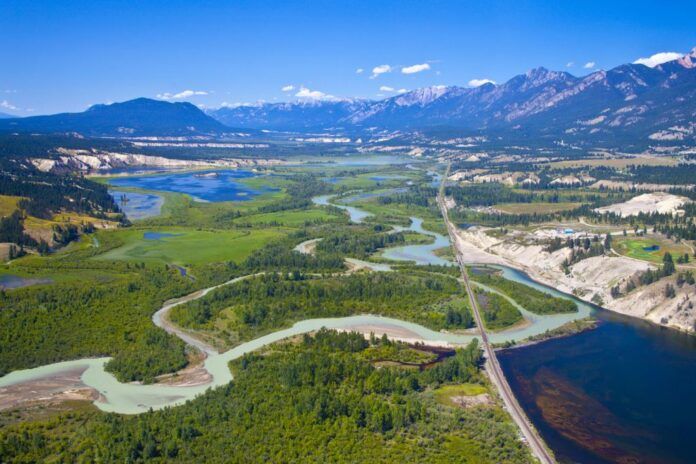Over $2.9-million from the Columbia Basin Trust (CBT) will help pay for projects aimed at enhancing biodiversity and ecosystems.
CBT officials said $2.6-million will be split up among four large-scale projects.
Meanwhile, six smaller-scale and short-term initiatives will get a share of $316,000.
“Basin residents have been clear in expressing their priority for on-the-ground environmental enhancement initiatives with long-term benefit across the region,” said Johnny Strilaeff, CBT President and CEO.
“Our Ecosystem Enhancement Program helps organizations and communities maintain and improve ecological health and native biodiversity in a variety of ecosystems. These efforts have created immediate positive impacts and are certain to be the foundation of healthy, diverse and functioning ecosystems for a long time to come.”
The largest grant recipients can be found below.
Nature Conservancy of Canada – $750,000
Money from CBT will be used by the Nature Conservancy of Canada to restore two different biomes in the Rocky Mountain Trench.
Officials with the Trust said a portion of this project will involve restoring over 280 hectares of open forests and grasslands.
This will involve work to thin out dense conifer in-growth and using prescribed burns to help maintain the ecosystem.
On top of that, funding will go towards the restoration of over 10 hectares of wetland and riparian habitat along Marion Creek.
This area on the west side of Columbia Lake is home to American badger, elk and westslope cutthroat trout, among other species.
“Grasslands and open forests are among the most imperilled ecosystems in BC, supporting almost one-third of the province’s species at risk,” said Richard Klafki, program director of the Canadian Rocky Mountains Program. “Using stewardship and restoration techniques, we can reduce the potential for catastrophic wildfire, help protect local communities and restore habitat for species at risk. We will also improve the ecosystem integrity and resilience of the wetlands along Marion Creek, making it a welcoming environment for waterfowl, shorebirds, amphibians and other wildlife to thrive.”
Columbia Wetlands Stewardship Partners – $776,000
This grant from Columbia Basin Trust will go to the Columbia Wetlands Stewardship Partners.
The organization will use the money to reinforce existing beaver dams, which officials said do more than provide shelter for the animals.
The five-year project will make sure precious wetland habitat is not lost to water draining from beaver dams that have failed or have not been renewed by the animals.
“By improving existing beaver dams and adding new ones in the valley bottom, removing ditches and reconnecting wetlands in upland benchlands, this project will restore critical wetland ecosystem functions on a minimum of 75 hectares in the Columbia Wetlands located in the Columbia Valley,” said CBT officials.
The Trust said this will help preserve habitats for a number of at-risk species, including grebes, American White pelicans, pygmy waterlilies and yellow widelip orchids.
“The desired outcomes of the project include more open-water habitat over winter and spring in the Columbia Wetlands and sufficient water to maintain wetlands in the benchlands,” said Suzanne Bayley, Columbia Wetlands Stewardship Partners president. “Our overarching goal is to restore critical ecosystem functions in wetlands to allow for adaptation and build resilience to climate change, thereby conserving species at risk dependent on these wetlands.”
Whitebark Pine Ecosystem Foundation – $495,815
Grant money from the Trust will go to restore whitebark and limber pine ecosystems in the Purcell and Rocky mountains.
CBT officials said the Whitebark Pine Ecosystem Foundation of Canada will use this funding to collect about 4,000 to harvest their seeds and plant 62,000 seedlings over 140 hectares of land.
The five-year project is a collaboration with Nupqu Native Plants, owned by the Ktunaxa Nation.
“Whitebark pine is a keystone species and its recovery will have benefits beyond the tree itself, including enhancing an important wildlife food source and restoring wildfire areas, which may help with plant community pioneering and soil stabilization,” said Randy Moody, President, Whitebark Pine Ecosystem Foundation of Canada. “This project will also build partnerships to ensure that others have the tools to restore this ecosystem into the future.”
Yaq̓ it ʔa·knuqⱡi’it First Nation – $588,985
This portion of the Trust’s funding will be used to fuel a five-year project aimed at restoring a five-acre plot around Horseshoe Lake to a healthy, functioning wetland.
“At one time, the northern portion of Horseshoe Lake, historically known as Shottanana Lake, held water year-round, supporting species at risk, such as the western painted turtle, and culturally important species, particularly ungulates,” said CBT officials.
The Yaq̓it ʔa·knuqⱡi’it First Nation will use the money to deep pools to access existing groundwater, remove invasive plants, and revegetate areas to stop invasive plants from moving back in.
“We hold a covenant with the Creator to be the caretakers and stewards of Yaq̓it ʔa·knuqⱡi’it lands,” said Nasuʔkin (Chief) Heidi Gravelle. “With that we have an obligation to restore, protect and be the voices of our lands. To achieve this, we are guided by our ‘ʔa·knumuȼtiⱡiⱡ’ (natural law), given to the Kootenai Peoples by our Creator. It is a powerful word and speaks to why we were put here on this land.”
“In return, our lands provide us with an ecosystem where our waters, plants and animals work together to provide us with the sustenance to maintain our ways of life since time immemorial. For there to be complete reconciliation with the land, there needs to be healing, and there is work to be done. For this to happen the people of this land (in this instance ʔakanuxunik̓) need to be involved at every level. We look forward to all the projects coming to fruition.”
You can see details on the smaller projects through the link below.
More: Ecosystem Enhancement Program grants (Columbia Basin Trust)






